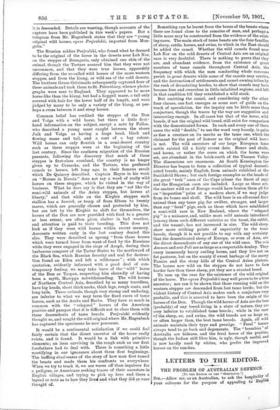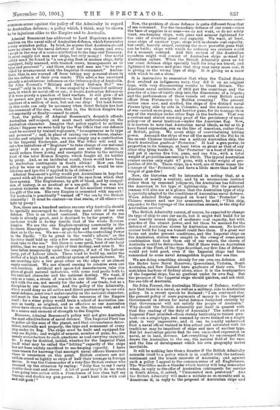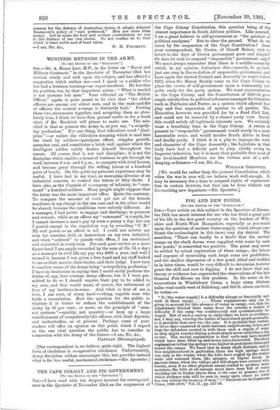LETTERS .TO , THE EDITOR.
THE PROBLEM OF AUSTRALIAN DEFENCE.
[To THE EDITOR OF TUE " SPECTATOR.!'] SIE,-AllOW me, as an Australian, to ask the hospitality of your columns for the purpose of appealing to English common-sense against the policy of the Admiralty in regard teAuStraha. n defence ; • a policy which, I think, may be shown
to be injurious alike to the Empire and to Australia.
Admiral Beaumont has addressed to Lord Hopetoun a memo- sentient on the naval side of Australian defence, which formulates livery mistaken policy. In brief, he argues that Australia should have, no share in the naval defence of her own shores and seas, except in the way of a. cash contribution to the Imperial Treasury. It must supply not men nor ships, but only money ! Our naval safety must be found in "a sea-going fleet of modern ships, fully equipped, fully manned, with trained crews, homogeneous as to type and personnel" ; and these ships and men are " to be pro- vided by arrangement with the Imperial Government." Austra- lians, that is, are warned off from taking any personal share in the sea defence of their own coasts. • This advice has exercised already a mischievous influence on the defence policy of Australia. Sir. John Forrest's "Military and Naval Defence Bill" was "naval" only in its title. It was shaped by a Council of military men, in which no naval officer sat; it treats Australian defence as if it were purely a question of land warfare. It will give—if all its powers are put in operation—a land force of nearly three- quarters of a million of men, but not one ship! Yet land forces on this scale can only be necessary when Great Britain has lost the command of the sea; when, that 'is, the British Empire has —temporarily or finally—ceased to exist.
Now, the policy of Admiral Beaumont's , despatch offends Australian self-respect, and must react unfavourably on the Australian character. Imagine that policy applied to military affairs I Suppose we were told by the War Office that our defence must be secured by trained regiments, " homogeneous as to type and personnel"; and, in place of raising our own forces, charac- teristic and original in type, we must simply pay a contribution to the Imperial Exchequer, and the War Office will send us out a few battalions of " Regulars" to take charge of our national safety! If such a policy governed our military defence, it would reduce these young and energetic States to the military level of the later Roman Empire, which fought all its battles by proxy. And, as an incidental result, there would have been no Australian contingents in South Africa! How can that policy be wise as applied to sea defence which would be mis- chievous and ignoble if applied to lead defence ? . Admiral Beaumont's policy would put Australians in hopeless quarrel with all the great traditions of the race from which they have sprung. The Englishman, by gift of blood, and by compul- sion of history, is as nautical as a sea-gull. He has won his greatest victories on the sea. Some of his manliest virtues are the gift of the sea. His very Empire is cemented with sea-salt ! Yet Australia is practically "warned off" the sea by the British Admiralty I It must be content—in that realm, of all others—to fight by proxy 1 Now, there are a hundred serious reasons why Australia should be specially encouraged to develop the naval side of her own defence. This is an island continent. The volume of its sea trade is already great, and is destined to be far greater. Our sea-borne' trade is to-day double that of the whole Russian Empire. We are the one English-speaking community in the Southern Hemisphere. Our geography and our destiny alike draw us to the sea. We are—or are to be—the controlling Power in the Pacific. "To be great in the world's affairs,' as the
Spectator itself told us only a few months ago, " the Australians must take to the sea." But there is some peril, bred of our local
politics, that we may lose sight of that destiny, and miss it. We have fallen temporarily under the empire, if not of the Labour party, yet of Labour ideals. These tend to build up, under the shelter of a high tariff, an artificial system of manufactures. We are crowding into a few great cities on the edge of an almost empty continent. We are almost ceasing to colonise even our own territory. Artificial and spoon-fed manufactures take the place of great natural industries, with some real perils both to the national character and the national destiny. We want, if only as a tonic, a strain of sea-salt in our blood. We need con- test with the sea, not merely for the sake of our trade, but as a discipline to our character. And the policy of the Admiralty, which would deny us all active and direct partnership in our own naval defence, must react unfavourably on the national character, and must in the long run impair the resources of the Empire itself ; for a wiser policy would train a school of Australian sea- men as hardy, as original, and as effective as our Australian riders have shown themselves to be on the African veld, and so be a source and element of strength to the Empire.
Moreover, Admiral Beaumont's policy will not give Australia the most effective form of naval defence. The Imperial Fleet has to police all the seas of the planet, and that circumstance deter- mines, naturally and properly, the type and armament of every ship under its flag. The ships• must be built and equipped for long sea flights ; and weight of armour, number of guns, &c., are merely sister-factors to such questions as coal-carrying capacity, dc. It may be doubted, indeed, whether for the Imperial Fleet itself what may be called the "hitting" capacity of the ships has not been unduly sacrificed to sea-keeping capacity. I have some reason for knowing that amongst naval. officers themselves there is uneasiness on this point. British cruisers are not
seldom armed-as lightly as ships of half their tonnage in foreign
navies. It was the Commander of a very fine British cruiser who summed up the situation by saying : "Jolly fine to say I carry
double their coal and stores ! A lot of good they'll do me when am going into action with a Frenchman of less than half my tonnage and double my gun power. I can't hurt him with coal and salt pork I " Now, the problem of shore-defence is quite different from that of sea command. For the immediate defence of our Coast—since the base of supplies is so near—we do not want, or do not solely want, sea-keeping ships, with guns and armour lightened for the sake of securing great' coal capacity. We want, at' least, some ships of another type ; ships with moderate coal capacity, ' but swift, heavily armed, carrying the most powerful guns that can be built ; ships with which no ordinary sea cruisers could for a moment contend. And this section ' of the Australian squadron might well consist of Australian ships manned by Australian sailors. When the British Admiralty gives us • for our coast defence ships specially built for long sea travel, and lightened in armour and guns that they may carry more coal, it is giving us the wrong type of ship. It is giving us a razor with which to cut a stone.
It is instructive to remember that when the United States first evolved an indigenous navy, they did it on an original type, with very disconcerting results to Great Britain. The American naval architects of 1812 put the scantlings and the gun-fire of a line-of-battle ship into the dimensions of a frigate ; and the performances of these vessels set every British naval officer from Portsmouth to Halifax swearing ! The present writer once saw, and studied, the ships of five distinct naval ' Powers lying side by side in Colombo; and the American man- • of-war carried more guns, and heavier guns, for its tonnage than any of the warships under other flags in the harbour. That was a curious and almost amusing proof of the persistency of naval policy—or of naval tradition—under the American flag. Now, it is curious to note that Australian naval ideals, as far as they have found expression, run on the line of American, rather than • of British, policy. We covet ships of overwhelming hitting , power. Amongst the ships of war off the month of the Pei-he in the recent Chinese troubles was a solitary Australian ship, the South Australian gunboat Protector: It had a gun-power, in proportion to its tonnage, at least twice as great as that of any . other ship lying beside it. The' Protector' is a boat of 900 tons; and yet it carries five 6 in. guns, and one 8 in., with a total weight of projectiles amounting to 680 lb. The typical Australian • cruiser carries only eight 41 guns, with a total weight of pro- jectiles
of 380 lb. These ships, in a word, are of three times the tonnage of 'the' Protector,' and have a little more than half its weight of gun-fire Now, the historian will be interested in noting that, at a distance of nearly a century, and by an unconscious instinct rather than by reasoned judgment, the Australian has followed the American in his type of fighting-ship. But the practical seaman will also see at a glance that the Australian type of ship is specially adapted to the conditions of Australian naval defence. When Admiral Bridge stepped on board the Protector' in Chinese waters and saw her armament, he said : " This ship, expanded to the tonnage of the Australian cruiser, is the ship for Australian service."
The British Admiralty cannot, of course, be expected to change its type of ship to suit our needs, but it might well 'build for us some heavily armed ships, of moderate coal capacity, but with gun-fire of the utmost power, and let them be manned for the defence of Australian shores by Australian seamen. No hostile cruiser built for long sea transit could face them. If a great war broke out under present conditions, and the Imperial ships on the Australian station vabre caught in the sweep of some great combination that took them out of our waters, the shores of Australia would be defenceless. But if there were an Australian section of the Fleet, of the type described, our first line of defence would yet hold good, even if the Imperial ships had been summoned to some naval Armageddon beyond the sea line.
We are doing something already for our own sea defence. All the States have Naval Reserves; Queensland, Victoria, South Australia, and New Zealand have gunboats of their own. The matchless harbour of Sydney alone, since it is the headquarters of the Imperial ships, has no gunboat under its own flag. But the presence of the Imperial ships should quicken, and not chill, the sea-life of Australia.
Sir John Forrest, the Australian Minister of Defence, realises now that there is a naval, as well as a military, side to Australian policy. In a recent speech he declared: "I am convinced that the present policy of mere payments of money to the Imperial Government in return for naval defence furnished entirely by that Government will not satisfy the people of Australia." Why should the British Admiralty put itself in quarrel with that fine reading of the duty of Australia? The notion of an Imperial Fleet moulded—from stately battleship to tiniest gun- boat—on a single type, and manned by crews trained on a single plan, is very impressive ; and it can be readily understood that a naval officer trained in this school and saturated with its traditions may be impatient of ships and men of another type. But let Australian genius find its own unchecked expression in naval, as in land, defence. Let everything be encouraged that draws the Australian to the sea, the natural field of his race, and the line of development which his own geography makes inevitable.
It will be nothing less than a disaster if the British Admiralty commits itself to a policy which is in conflict with the nations, sentiment and the truest interests of Australia; and against• such a policy I appeal to the common-sense of all Englishmen. The War Office made a blunder which history will long remember when, in reply to the offer of Australian contingents for:service in South Africa, it cabled, " Unmounted men preferred." And the British Admiralty will make a mistake as memorable and as disastrous 'if, in reply to the proposal of A.astralian ships and seamen for the defence of Australian shores, it adopts Admiral Beaumont's policy of "cash preferred." Men are more than money. Let us make the best and noblest contribution we can to the defence of our own shores. Do not confine us to that which is least noble and of least value.
—I am, Sir, &c., W. H. FITCHETT.
















































 Previous page
Previous page